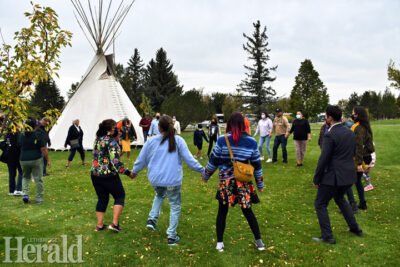Gathering marks 144 years since Treaty 7 signing
By Herald on September 22, 2021.
 Participants take part in a drum and round dance led by Ruben Big Sorrel Horse at a ceremony Wednesday afternoon at Tourism Lethbridge in honour of the signing of Treaty 7 back in 1877. Herald photo by Dale Woodard
Participants take part in a drum and round dance led by Ruben Big Sorrel Horse at a ceremony Wednesday afternoon at Tourism Lethbridge in honour of the signing of Treaty 7 back in 1877. Herald photo by Dale WoodardDale Woodard – Lethbridge Herald
The signing of Treaty 7 exactly 144 years ago was honoured as the public was invited for a gathering Wednesday afternoon at the Tourism Lethbridge centre.
Treaty 7 was signed on Sept. 22, 1877, an agreement between the Crown and five bands in southern Alberta, the Kainai (Blood), Siksika (Blackfoot), Piikani (Peigan), Nakoda (Stoney) and Tsuu T’ina (Sarcee).
The ceremony – which included a teepee raising with Garrett Standing Alone, an introduction of drum and round dance with Ruben Big Sorrel Horse and fry bread – also celebrated Indigenous tourism, allowing First Nation communities to tell their stories.
“Treaty 7 was the last treaty to be signed between the Great Plains Nation and the Government of Canada. This is significant and it brings together all the First Nations and Indigenous groups in our region,” said Jasmine Sangria, CEO of Tourism Lethbridge. “I think it’s really important for people to understand this is part of our culture (and) the Blackfoot people are part of our culture. They’re very significant and it’s part of our history. We should be honouring the fact this is their land and we live here. We should also be honouring the fact there’s a lot of Indigenous businesses and tourism and attractions that people don’t realize are part of our history and culture, such as Writing On Stone and Head Smashed In. They’re so rich in culture and have to do with Treaty 7.”
Sangria said it’s important to continue to understand the importance of Indigenous and First Nations culture and history, but added there is still a lot that needs to be done.
“We still need to work together and we need to support what’s happening. We need to move forward and not dwell on the past, but we need to work together and understand what’s happening so we work together and really celebrate our culture”
Shae Bird, CEO for Indigenous Tourism Alberta, said Indigenous tourism plays a big role in reconciliation.
“I believe Indigenous tourism plays a key part in providing a platform for our Indigenous communities and entrepreneurs to really share their story authentically from that Indigenous voice and in doing so, educating and providing those steps, both for non-Indigenous people here in Canada, but also visitors from the U.S. and International markets, to learn about the culture that we now know as Alberta,” he said. “There is so much demand for Indigenous tourism, both domestically and internationally. We see that demand continues to grow and we’re seeing an increased appetite from our Canadian and Alberta residents on a better understanding of the cultural significance of the communities in their backyard that they may not have known were always there. I see the demand for Indigenous tourism continuously growing and also that entrepreneurship and the environment of Indigenous communities to create that Indigenous economy through Indigenous tourism supporting and giving back to the community and also providing those steps toward reconciliation and cultural revitalization.”
Wednesdays’ ceremony was also about showing off Indigenous artists and their work.
“Their beadwork, their dresses and their skirts, all of that,” said Katie Rabbit Young Pine, a board member with Tourism Lethbridge and chairperson for the Indigenous Advisory. “It’s to create awareness and recognize we did have a different style of dress. We had jewelry and probably the same inclinations of most females that we wanted to look nice and a lot of our art work, beadwork and dresses that are out there with the vendors shows that.”
Sangria said other initiatives will be forthcoming.
“In the next three weeks we’ll be setting up an Indigenous advisory committee to help us with all of our marketing plans going forward. I think it’s very important to have that voice at the table so we build an Indigenous tourism sector here in the region.”
Follow @DWoodardHerald on Twitter
15-14




